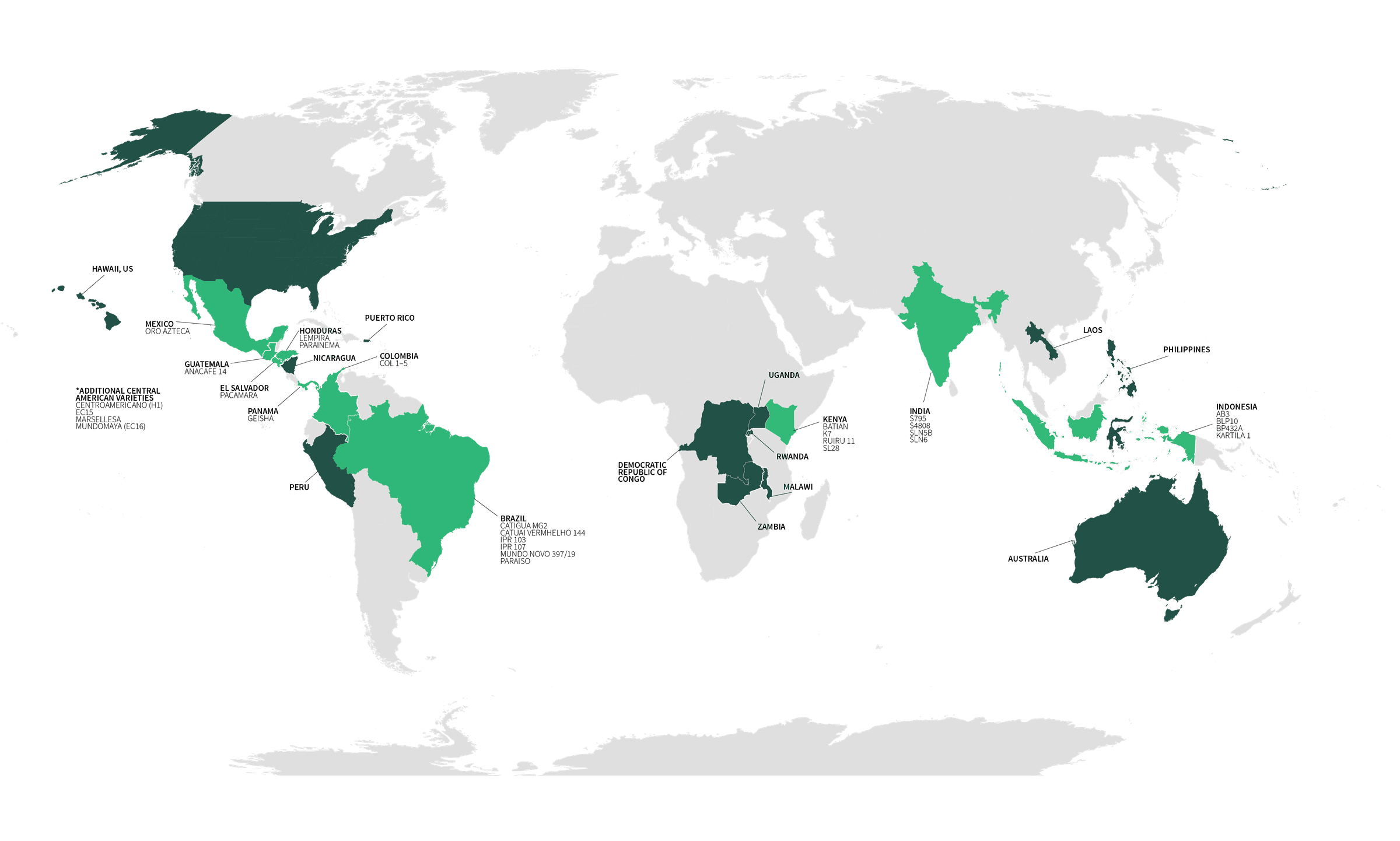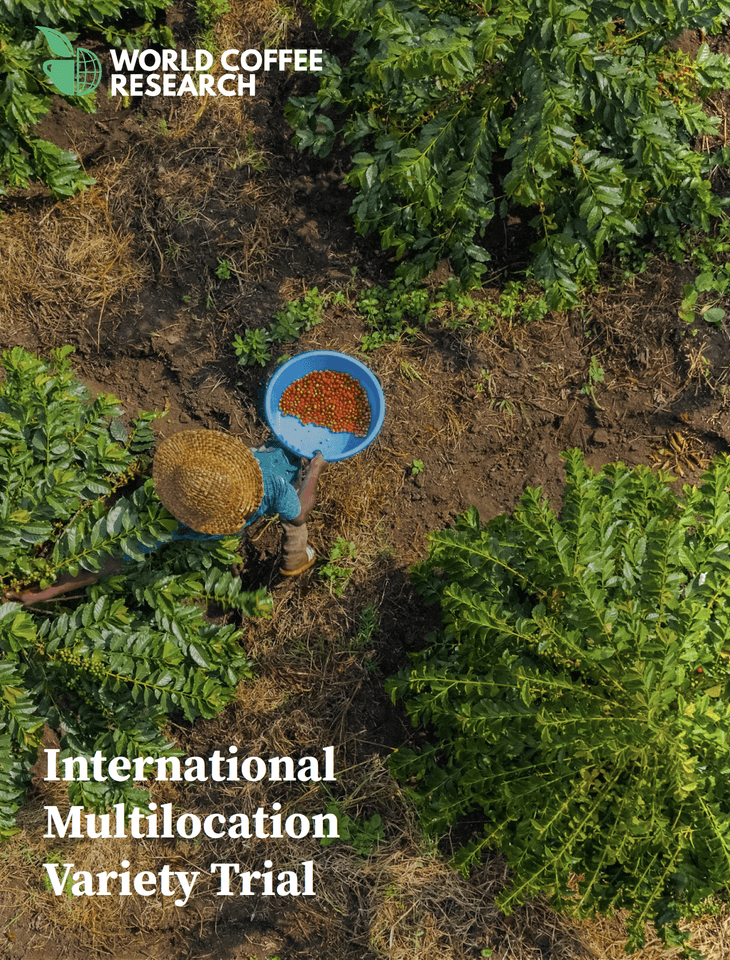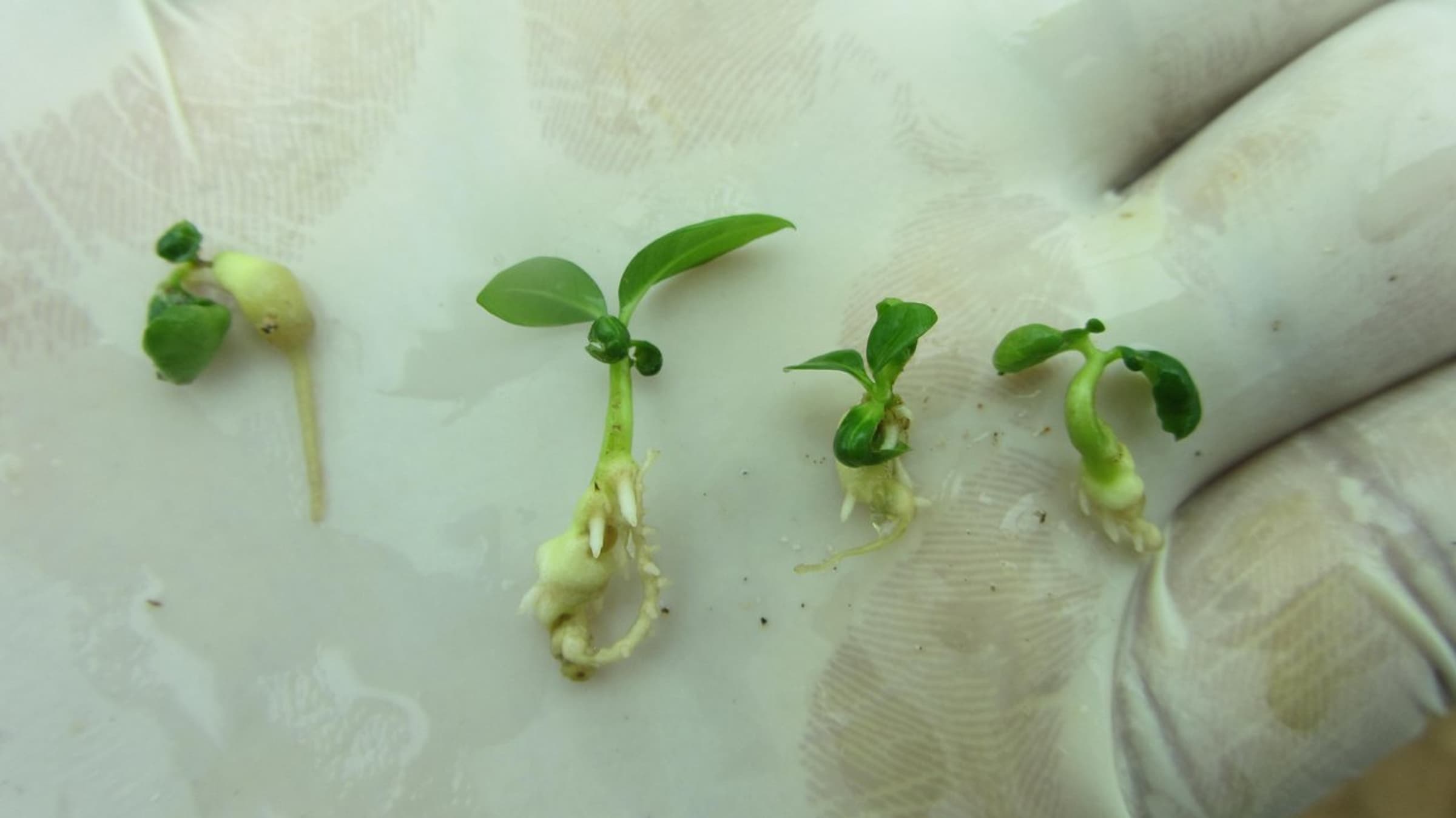- Central Coffee Research Institute (CCRI)
- Indonesian Coffee and Cocoa Research Institute (ICCRI)
- Kenya Agricultural & Livestock Research Organization (KALRO)
- National Coffee Research Institute (NaCORI)
- Southern Cross University
- Department of Agricultural Research Services (DARS)
- USDA Agricultural Research Service
- ECOM Trading
- CENFROCAFE
- Rwanda Agriculture and Animal Resources Development Board (RAB)
Trials
International Multilocation Variety Trial
A first-of-its kind undertaking to facilitate global research on the world’s highest quality coffee varieties.
The problem
Coffee farmers typically have very few choices about which varieties are available for them to plant. Their choices are limited by forces beyond their control—historical accident and colonial history on the one hand, and whether their country has a tradition of coffee research and development on the other. These constraints mean that coffee producers often plant seeds that are susceptible to disease or don’t perform optimally in their area, leaving them doubly vulnerable. Until now no comprehensive effort had ever been made to locate the best-quality coffee varieties from around the globe and study their performance in different countries, including evaluation of possible release of varieties in new countries.

Eleven contributors (countries in light green) supplied varieties for the trial. All varieties are shipped to participating countries (countries in dark green) to be grown and evaluated in research plots.
The solution
31 varieties from around the world. 29 test plots in 18 countries. 50,000 plantlets.
World Coffee Research has gathered 31 top-performing coffee varieties from 11 suppliers around the world. The varieties—most of which have never been tested on a broad basis—are distributed to coffee growing countries for long-term evaluation on research plots.
The IMLVT generates critical knowledge for coffee producers and agronomists about how varieties respond to different soil and climatic conditions – including extreme environments with high temperatures and long dry periods, which mimic the changing climate coffee growers are seeing in coffee-producing countries around the world. The trial will allow researchers to see how varieties perform under climates predicted for 30 and 50 years into the future and provides the largest global dataset ever created for deciphering genotype x environment interaction in coffee. A follow-on study will investigate the impact of the GxE interaction on cup quality and chemistry.
Researchers will identify key traits that have allowed different varieties to adapt to different environmental conditions, which will lay the groundwork for major advances in coffee breeding, climate adaptation strategies, and future research.
The trial also builds essential capacity within producing countries to conduct coffee research and monitor disease movement and climate trends. All participating countries agree to install, maintain, and monitor the plots (on average 1-3 per country). On each plot, a comprehensive list of variables is measured using standardized protocols developed by WCR. Each country monitors how the different varieties perform under local conditions. Countries can monitor the best-performing varieties and, in some cases, negotiate for access to multiply and distribute them producers to increase supplies of quality coffee for those countries.

pdf
International Multilocation Variety Trial: How It Works
A summary of our largest trial to date
Impact
Never before have most countries had access to so many different varieties. Farmers around the world—as well as coffee producing countries and the industry as a whole— will benefit from access to new varieties with better productivity, disease tolerance and/or cup quality. This will result in widespread production and quality increases, contributing to more sustainable farmer livelihoods and a stronger coffee sector.
“WCR has now matured a unique network to gather global data on varieties and performance in such a huge number of different environments. It has never been done in the centuries of the existence of the coffee market. This legacy will last forever.” —Giacomo Celi, Director of Sustainability, Mercon
International Multilocation Variety Trial
Our Partners
Below are the partners and countries currently participating in the International Multilocation Variety Trial.
Latin America
Nicaragua
ECOM Trading
ECOM Agroindustrial is a global commodity trading and processing company based in Switzerland. The company specializes mainly in coffee, cocoa, and cotton. ECOM has more than 40 offices located in over 35 countries all around the world. It is the largest coffee miller in the world.
Oceania
Australia
Southern Cross University
Southern Cross University is an Australian public university, with campuses at Lismore and Coffs Harbour in northern New South Wales, and at Coolangatta, the most southern suburb of the Gold Coast in Queensland.
Asia
India
Central Coffee Research Institute (CCRI)
CCRI, established in 1925, is the research and extension arm of the Coffee Board of India. CCRI is located in the heart of Karnataka, India’s most important coffee region.
North America
United States
USDA Agricultural Research Service
The Agricultural Research Service (ARS) is the U.S. Department of Agriculture's chief scientific in-house research agency. Their mission is to deliver scientific solutions to national and global agricultural challenges, from field to table.
Asia
Indonesia
Indonesian Coffee and Cocoa Research Institute (ICCRI)
ICCRI was established in 1911 and has played an active role in the research and development of coffee and cocoa in Indonesia for more than a century. In 2013, the national Ministry of Research and Technology declared ICCRI a Center of Excellence (CoE) for coffee.
Africa
Kenya
Kenya Agricultural & Livestock Research Organization (KALRO)
KALRO conducts research to catalyze sustainable growth and development in Kenya’s agriculture sector. Kenya has one of the longest histories of formal coffee research in the world, commencing in 1908.
Africa
Malawi
Department of Agricultural Research Services (DARS)
DARS has been generating agricultural technologies to address the challenges that hinder progress in agricultural productivity, food, and income security. DARS is the driving force in the development and dissemination of agricultural technologies in Malawi.
Latin America
Peru
CENFROCAFE
Africa
Rwanda
Rwanda Agriculture and Animal Resources Development Board (RAB)
The Rwanda Agriculture and Animal Resources Development Board (RAB) is an autonomous body established by LAW N°38/2010 OF 25/11/2010 and Currently, RAB is governed by Presidential Order N° 074/01 OF 09/12/2022 Governing Rwanda Agriculture and Animal Resources Development Board (RAB), determining its mission, organization, and functioning. The law specifies that: The mission of RAB is to develop agriculture and animal resources through research, agricultural extension and animal resources extension in order to increase agricultural and animal resources productivity and quality, as well as their derived products.
Africa
Uganda
National Coffee Research Institute (NaCORI)
NaCORI conducts and manages basic and applied research for coffee in support of national goals to increase the value of coffee exports. NaCORI is one of 16 public agricultural research institutes of the National Agricultural Research Organization (NARO), and has been named a Center of Robusta Excellence.
